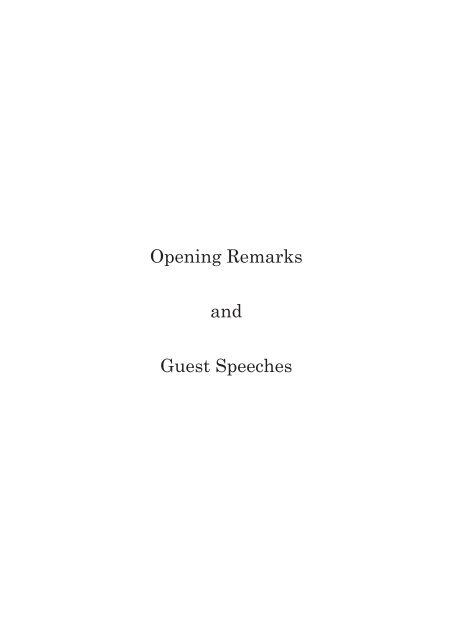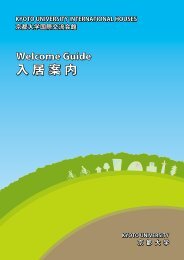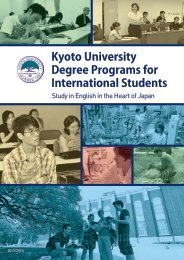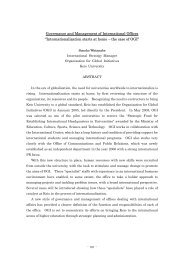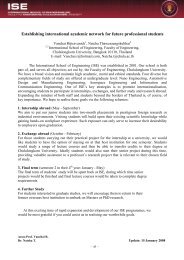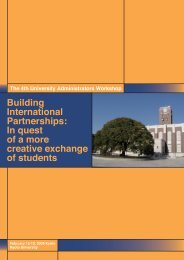Opening Remarks and Guest Speeches
Opening Remarks and Guest Speeches
Opening Remarks and Guest Speeches
You also want an ePaper? Increase the reach of your titles
YUMPU automatically turns print PDFs into web optimized ePapers that Google loves.
<strong>Opening</strong> <strong>Remarks</strong><br />
<strong>and</strong><br />
<strong>Guest</strong> <strong>Speeches</strong>
The 2 nd University Administrators’ Workshop:<br />
Innovating Universities through Internationalisation<br />
<strong>Opening</strong> <strong>Remarks</strong><br />
by<br />
Toshio Yokoyama<br />
Distinguished <strong>Guest</strong>s, Dear Colleagues from Asian Countries, Ladies <strong>and</strong><br />
Gentlemen. It is my great honour <strong>and</strong> pleasure to welcome you here today on the<br />
occasion of the 2nd University Administrators’ Workshop.<br />
The theme chosen for this workshop is: Innovating Universities through<br />
Internationalisation. I am sure you will all agree that this sounds a readily<br />
comprehensible theme for us, but if we take into account that every participant<br />
gathered here is to represent the administrative side of his or her university’s<br />
international activities, it is clear that our chosen theme is epoch-making, implying, as<br />
it does, that the future of our universities depends on the efforts of their administrators.<br />
In this, we have a message that challenges the conventional perception that universities<br />
should be governed solely by professors -- an idea formulated perhaps in nineteenth<br />
century Germany which was disseminated <strong>and</strong> took root in many Asian countries,<br />
particularly in Japan, around the turn of the nineteenth century. For myself, I do not<br />
believe that it is altogether out-dated for professorial bodies to be self-governing. On<br />
the other h<strong>and</strong>, I do believe that the role of university administrators has not always<br />
been properly defined, <strong>and</strong> is often under-estimated, particularly in Japan. For this<br />
reason, I feel that the time has come to search for new models of university<br />
organisations which encourage academics <strong>and</strong> administrators to co-operate in<br />
increasingly close <strong>and</strong> creative ways. This applies particularly to the field of<br />
international activities.<br />
I emphasise this point because the twenty-first century is already revealing its<br />
own characteristics, one of which can be called, ‘The Age of Intermediaries’, in Japanese,<br />
‘Naka-dachi no Jidai.’ In the last century, academics, specialist groups <strong>and</strong> institutions<br />
alike tended to be too absorbed <strong>and</strong> inward-looking to think about the importance of<br />
intermediaries <strong>and</strong> the creative roles they played. In the minds of conventional<br />
scientists, for example, internationalisation too often meant a simple extension of<br />
relationships across national boundaries within their own fields. In this new age of<br />
profound change, however, when even the notions of Nature <strong>and</strong> Humanity are under<br />
7
serious review, any new knowledge obtained, or any new question that comes up in<br />
laboratories <strong>and</strong> in study rooms needs to be considered in terms of its meaning for the<br />
entire human <strong>and</strong> ecological community on this planet. Everyone in academia must,<br />
therefore, continue discussions internationally <strong>and</strong> across disciplines; <strong>and</strong> for this,<br />
cultivate languages accessible across the borders of discipline <strong>and</strong> nation. It is in such<br />
a new global context that each university must open more varieties of intermediary<br />
channels <strong>and</strong> networks than ever before, to prepare for proper dialogues <strong>and</strong><br />
co-operations not just within world academia but more importantly with society at large.<br />
I hope that many of you will share my prospects that this workshop will meet the<br />
challenges of this new stage in human history, the significance of which may become<br />
equivalent to that of the Renaissance in Europe some five hundred years ago.<br />
The First University Administrators’ Workshop held in Kyoto a year ago<br />
offered many of its participants their first experience to enjoy extensive discussions<br />
with their colleagues from different countries, free from interruption <strong>and</strong> disturbance<br />
from ever-dem<strong>and</strong>ing Presidents, Vice-Chancellors or other faculty members. My<br />
colleagues were relieved to discover that many of the administrative difficulties they<br />
had been facing individually in pursuing international activities were in fact common to<br />
us all.<br />
The idea behind this Second Workshop is that we can take a further step<br />
forward in asking ourselves how we might support one another with regards to the<br />
capability of our respective international offices, or how might we all perform as good<br />
intermediaries for international co-operation, enriching our own experience <strong>and</strong><br />
knowledge in the process of elevating others. This type of endeavour with a broad<br />
communal spirit is the very essence of the traditional idea of ‘civilised society’.<br />
For this workshop, Kyoto University sent requests for participation to member<br />
universities of the Asian group within the Association of Pacific-Rim Universities, as<br />
well as member universities of the Association of East Asian Research Universities, <strong>and</strong><br />
a number of universities in Asia which have MoU agreements with Kyoto University.<br />
Similar letters were sent to universities in Japan that have made notable strategic<br />
efforts to internationalise their academic activities. The result is that more than<br />
twenty eminent universities in Asia have consented to send representatives to Kyoto,<br />
<strong>and</strong> for this, I should like to express my heart-felt gratitude. I should also like to take<br />
this opportunity to thank Vice-President, Professor Dr Ernst Rank of Technische<br />
Universität München, <strong>and</strong> Vice-Provost, Professor Dr William B. Lacy of the<br />
University of California, Davis, who have kindly agreed to give <strong>Guest</strong> <strong>Speeches</strong> before<br />
the working sessions. Both Vice-President Rank <strong>and</strong> Vice-Provost Lacy will, I am sure,<br />
8
contribute greatly to our Workshop’s proceedings, by sharing with us their views with<br />
regards to what is happening in <strong>and</strong> around their esteemed universities, <strong>and</strong> what kind<br />
of ideals or missions are guiding those institutions.<br />
The City of Kyoto, Japan’s old capital, has had a history of ups <strong>and</strong> downs for<br />
more than twelve hundred years long, <strong>and</strong> has, as the result, developed a rich tradition<br />
of seeking harmony with the environment. It is my sincere hope that holding this<br />
two-day workshop in such a cultural milieu will enhance mutual underst<strong>and</strong>ing <strong>and</strong><br />
friendship among us, <strong>and</strong> foster chances to promote truly necessary international<br />
initiatives from among the participating universities.<br />
Thank you for your kind attention.<br />
9
Internationalization <strong>and</strong> TUM’s strategy in the German ‘Excellence Initiative’<br />
Prof. Dr. Ernst Rank<br />
Vice President<br />
Technische Universität München<br />
Arcisstrasse 21<br />
D-80333 München<br />
rank@bv.tum.de<br />
ABSTRACT<br />
On 23 June 2005 the German federal <strong>and</strong> state governments agreed on an initiative to<br />
promote top-level research in Germany. The so-called Excellence Initiative aims to<br />
strengthen science <strong>and</strong> research in Germany in the long term, improve its international<br />
competitiveness <strong>and</strong> raise the profile of the top performers in academia <strong>and</strong> research.<br />
The total budget of the initiative will be €1.9 billion for the period 2006 through 2011, which<br />
is split between three lines of funding:<br />
<br />
<br />
<br />
Graduate Schools to promote young researchers<br />
Clusters of Excellence to promote world-class research<br />
Institutional strategies to promote top-level university research.<br />
This Excellence Initiative launched an unprecedented atmosphere of departure at German<br />
universities resulting in a total of nearly 500 proposals for the three lines of funding. On 13<br />
October 2006 after a highly competitive international review process the results of the first<br />
round of the initiative were announced. Only three universities, the Karlsruhe University of<br />
Technology, the Ludwig-Maximilians-Universität München (LMU) <strong>and</strong> the Technische<br />
Universität München (TUM) were successful in all three lines, giving them the unofficial<br />
title of an ‘Elite University’ <strong>and</strong> the expectation of about 150 Mio € additional funding for the<br />
next five years.<br />
In the proposal of Technische Universität München internationalization plays a very<br />
prominent role. The promotion of high-level international research cooperation is central in<br />
the ‘TUM Institute for Advanced Study’, which has been founded as a cornerstone of the<br />
institutional strategy. And the ‘International Graduate School of Science <strong>and</strong> Engineering’<br />
has as one major goal to stimulate international research groups of students during their<br />
Master’s <strong>and</strong> PhD studies, being supported by TUM <strong>and</strong> partner universities all over the<br />
world.<br />
Starting from the general policy of TUM, the lecture will first focus on the overall strategy of<br />
the successful proposals, highlight their most important aspects <strong>and</strong> discuss the expectation<br />
from the projects over the next years especially in the context of further improving our<br />
international networks in research <strong>and</strong> education.<br />
11
Internationalization <strong>and</strong> TUM‘s Strategy<br />
in the German ‚Excellence Initiative‘<br />
Ernst Rank<br />
Vice President<br />
Technische Universität München<br />
Germany<br />
Kyoto, Feb. 1, 2007<br />
INTERNATIONAL NETWORK: more than 150 partner universities<br />
German Institute of<br />
Science <strong>and</strong> Technology<br />
in Singapur<br />
Kyoto, Feb. 1, 2007<br />
TUM: A Unique Profile<br />
Superb Community Entrepreneurial Spirit<br />
• 21,000 Students<br />
• 400 Tenured Professors<br />
•4040 Researchers<br />
•2600 Graduates p.a.<br />
• 730 Ph.D/Habils. p.a.<br />
6800 Employees<br />
12 Departments<br />
32% female<br />
20% international<br />
• Internationality:<br />
•#1 AvH Senior Research Awards<br />
•Off-Shore Branch Singapore<br />
• Fundraising >100 M€ since 1999<br />
• Third Party Funding: 147 M€ (05)<br />
= 31% of total Budget, #1 GER<br />
• Entrepreneurial Assets:<br />
UnternehmerTUM, TUM-Tech Ltd.<br />
Innovative Strategies<br />
• Advanced Organizational Structure: 1999 TUM constitution pioneered<br />
Bavarian Higher Education Act 2006<br />
• Centers of Excellence Strategy: Competitive restructuring program innovaTUM<br />
(2003) allocates 10% total TUM resources to areas of excellence until 2008<br />
• Social & Cultural Awareness: Linde Academy, Gender Responsibility<br />
Kyoto, Feb. 1, 2007<br />
Excellence Initiative by the German Government<br />
• “promote top-level research <strong>and</strong> improve the quality of German universities<br />
<strong>and</strong> research institutions, thereby making a significant contribution to<br />
strengthening science <strong>and</strong> research in Germany.“<br />
• 1,9 billion € “fresh money“ for German universities 2006 - 2011 (2 funding<br />
periods 2006-2010 <strong>and</strong> 2007-2011, 5 yrs. each)<br />
• Financing by federal (75%) <strong>and</strong> state governments (25%)<br />
• Three Funding Lines: Graduate Schools, Research Clusters <strong>and</strong> Institutional<br />
Strategies<br />
• Decision: 13 October 2006<br />
Kyoto, Feb. 1, 2007<br />
12
Results of the Excellence Initiative (1st Funding Period)<br />
• 18 Graduate Schools<br />
• 17 Clusters of Excellence<br />
• 3 Institutional Strategies<br />
• Concentration on 22 Universities<br />
• Fields of Natural Sciences <strong>and</strong> Life<br />
Sciences more successful than<br />
Engineering <strong>and</strong> Humanities<br />
• TUM one of the most successful<br />
universities<br />
Kyoto, Feb. 1, 2007<br />
2nd Funding Line at TUM: Clusters of Excellence<br />
A.I. Astrophysics Proteins Photons Nano<br />
Cognition for<br />
Technical<br />
Systems<br />
Origin <strong>and</strong><br />
Structure of<br />
the Universe –<br />
The Cluster of<br />
Excellence for<br />
Fundamental<br />
Physics<br />
Munich Center<br />
for Integrative<br />
Protein<br />
Science<br />
(CIPS M )<br />
Munich Center<br />
for Advanced<br />
Photonics<br />
(MAP)<br />
Nanosystems<br />
Initiative<br />
Munich (NIM)<br />
Coordinator:<br />
Prof. Buss<br />
Coordinator:<br />
Prof. Paul<br />
Coordinators:<br />
LMU: Prof. Carell<br />
TUM: Prof. Skerra<br />
Coordinators:<br />
LMU: Prof. Habs /<br />
Prof. Krausz<br />
Coordinators:<br />
LMU: Prof. Kotthaus<br />
TUM: Prof. Abstreiter<br />
Kyoto, Feb. 1, 2007<br />
1st Funding Line at TUM: Graduate Schools<br />
International Graduate School<br />
of Science <strong>and</strong> Engineering<br />
Graduate School of<br />
Systemic Neurosciences<br />
Coordinator: Prof. Rank<br />
Prof. Br<strong>and</strong>t / Prof. Grothe (LMU)<br />
Prof. Konnerth (TUM)<br />
Kyoto, Feb. 1, 2007<br />
3rd Funding Line: TUM. The Entrepreneurial University.<br />
Funding:<br />
56 Mio € (2006-2011)<br />
Kyoto, Feb. 1, 2007<br />
13
What does it take to be an entrepreneurial university?<br />
“Entrepreneurship is the pursuit of opportunity beyond the<br />
resources one currently has under control“<br />
Stevenson <strong>and</strong> Jarillo 1990<br />
“How do universities, by means of entrepreneurial action, go<br />
about transforming themselves? Five elements constitute an<br />
irreducible minimum: a strengthened steering core; an<br />
exp<strong>and</strong>ed developmental periphery; a diversified funding<br />
base; a stimulated academic heartl<strong>and</strong>; an integrated<br />
entrepreneurial culture.”<br />
Prof. Burton R. Clark (1998), Graduate School of Education, UCLA<br />
Kyoto, Feb. 1, 2007<br />
TUM-IAS: The Vision<br />
• Provide top-level scientists with the<br />
freedom <strong>and</strong> resources to pursue<br />
innovative research<br />
(interdisciplinarity – high risk, high reward)<br />
• Interact with talented young scholars<br />
(‘akademische Schulenbildung’)<br />
• Integrate distinguished visiting scientists<br />
(internationality)<br />
Create a scholarly community of open<br />
scientific dialogue<br />
Headquarters Building<br />
• Central location on Garching Campus<br />
• Secured funding, doubled to 10 M€<br />
since submission of proposal<br />
Kyoto, Feb. 1, 2007<br />
Kyoto, Feb. 1, 2007<br />
Fellowship Programs: Genuine, Competitive<br />
Carl von Linde Senior Research Fellowships<br />
open to TUM faculty<br />
Carl von Linde Junior Researcher Awards<br />
for postdoctorial fellows from TUM<br />
Rudolf Diesel Industrial Fellowships<br />
for researchers from industry<br />
Hans Fischer Fellowships<br />
open for international scientists<br />
Hans Fischer Tenure Track Professorships<br />
for young scientists from outside<br />
Research Start-Up Support<br />
Kyoto, Feb. 1, 2007<br />
14
... at all career stages<br />
ducaTUM: Strengthens our alliance with High-School System<br />
Student Admission Center (SAC) – International Recruiting Centers<br />
Welcome Office – International Student Service Center<br />
Academic Lecturer Program<br />
Summer School Academy<br />
Young Researchers Program:<br />
International Executive Headhunting<br />
Structural Fund for ‘Rising Stars‘<br />
Emeriti of Excellence Program<br />
Career Service Center<br />
Kyoto, Feb. 1, 2007 Kyoto, Feb. 1, 2007<br />
... a challenge for Good Corporate Governance<br />
• Gender Consulting & Awareness<br />
• Childcare / Home Office Workplaces<br />
• Family Care Structural Fund<br />
• Gender Issues Incentive Fund<br />
• Vocational Training<br />
• Parental Leave Compensation<br />
• Munich Dual Career Center<br />
• Fundraising Focus: Scholarships for<br />
talented women in science<br />
IAS Liesel Beckmann<br />
Symposium 2007:<br />
dedicated to Gender & Diversity<br />
Kyoto, Feb. 1, 2007 Kyoto, Feb. 1, 2007<br />
15
... to advance the spirit of community<br />
• Best-Practice Administration<br />
Corporate Management Training<br />
• Process <strong>and</strong> Quality Management<br />
• Soft Skills <strong>and</strong> Cultural Awareness<br />
• Good Corporate Governance –<br />
Health Care & Prevention Campaign<br />
• TUM Corporate Communications Center<br />
Kyoto, Feb. 1, 2007 Kyoto, Feb. 1, 2007<br />
The TUM Graduate School System<br />
IGSSE Admission & Paths to Degrees<br />
The TUM Graduate School<br />
Framework<br />
Policy<br />
Services<br />
Research<br />
International labor markets<br />
PhD & IGSSE Certificate<br />
Graduate School<br />
of<br />
Information<br />
Science in Health<br />
…<br />
International<br />
Graduate School of<br />
Science <strong>and</strong> Engineering<br />
RTG<br />
Thematic Missions<br />
…<br />
Research Topics<br />
…<br />
Graduate<br />
School of<br />
Systemic<br />
Neurosciences<br />
TUM-LMU<br />
Graduates<br />
(Int’l. Universities)<br />
Undergraduates<br />
(TUM & Int’l. Univ.)<br />
Doctoral phase<br />
Master’s Degree<br />
Research<br />
50 ECTS<br />
Pre-doctoral phase<br />
Bachelor’s Degree<br />
Curricular Part<br />
120 ECTS<br />
Kyoto, Feb. 1, 2007<br />
Kyoto, Feb. 1, 2007<br />
innovaTUM-2008<br />
„Die deregulierte Hochschule“<br />
‘Elite’ programs<br />
Admission<br />
Admission<br />
16
IGSSE Research Training Program<br />
Scientific Mentoring<br />
Multiple supervision<br />
(PhD phase)<br />
Individual research<br />
training schedule<br />
for every student<br />
Student research<br />
groups interlink<br />
MSc <strong>and</strong> PhD<br />
phase<br />
PhD & IGSSE Certificate<br />
Research<br />
Doctoral phase<br />
Master’s Degree<br />
Research<br />
50 ECTS<br />
Pre-doctoral phase<br />
Curricular Part<br />
120 ECTS<br />
Modular Training Program<br />
Disciplinary training<br />
Trans-disciplinary training:<br />
e.g. summer schools<br />
International <strong>and</strong> industrial<br />
exchange<br />
Scientific skills training:<br />
research proposals,<br />
conferences, scientific<br />
leadership<br />
Soft skills training: business<br />
plan seminars, social awareness<br />
<strong>and</strong> communication<br />
skills, intercultural & ethical<br />
competence<br />
Bachelor’s Degree<br />
Kyoto, Feb. 1, 2007<br />
Multi-disciplinary IGSSE Young Researcher‘s Teams<br />
Typical Team:<br />
2 PhD students funded by IGSSE<br />
• >= 2 PhD students funded by industry<br />
• postdoc (team leader)<br />
•Collaborating research groups at partner universities<br />
Current state:<br />
• 10 research team proposals approved<br />
•Collaborating institutions:<br />
•Univ. Stanford, Univ. Tokyo, DTU, Weizman Inst., ETH Zürich, TU<br />
Vienna, Univ. New South Wales, Duke Univ.,DLR, Fuijtsu Labs, …<br />
Kyoto, Feb. 1, 2007<br />
IGSSE Research Training Groups & MSc Programs<br />
7 Research Training<br />
Groups (PhD Programs)<br />
10 Int‘l. Master Programs<br />
Based on existing<br />
structures (functionality<br />
& funding secured)<br />
Interconnected by<br />
common research<br />
topics<br />
CompInt<br />
Materials Science of<br />
Complex Interfaces<br />
BioMedTUM<br />
Biomedical<br />
Microsystems<br />
Engineering<br />
MSc Medical<br />
Engineering<br />
MSc Engineering<br />
Physics<br />
EnSE<br />
Energy Science<br />
& Engineering<br />
CeCVDE<br />
Computational <strong>and</strong><br />
Visual Data Exploration<br />
MSc Computational<br />
Science & Eng.<br />
MSc Computational<br />
Mechanics (COME)<br />
ESPACE-GS<br />
Earth Oriented Space<br />
Science <strong>and</strong> Technology<br />
MSc ESPACE<br />
CeSIM<br />
Center for Simulation<br />
Technology in<br />
Engineering<br />
NanoCat<br />
Nanodesign of High<br />
Performance Catalysts<br />
MSc Chemistry<br />
MSc Renewable<br />
MSc Chemical<br />
Energies<br />
Process Eng.<br />
MSc Electric Power<br />
Engineering<br />
MSc Catalysis<br />
Kyoto, Feb. 1, 2007<br />
An Example: Numerical Simulation <strong>and</strong> Biomedical Technology<br />
Optimize endoprosthesis <strong>and</strong> fracture fixation procedures<br />
• Material identification<br />
• Very fast transfer from CT-scan to simulation<br />
model for individual surgery planning<br />
• Bone regeneration<br />
Kyoto, Feb. 1, 2007<br />
17
The TUM Business & Industry Network<br />
Kyoto, Feb. 1, 2007<br />
Kyoto, Feb. 1, 2007<br />
The Raitenhaslach TUM Study & Residence Center<br />
Kyoto, Feb. 1, 2007<br />
18
Enhancing International Learning, Discovery <strong>and</strong> Engagement<br />
Seven Essential Institutional Components<br />
William B. Lacy<br />
University of California, Davis<br />
ABSTRACT<br />
As the world becomes more complex <strong>and</strong> interconnected, it is critical that our colleges<br />
<strong>and</strong> universities effectively engage in international research <strong>and</strong> collaboration, <strong>and</strong><br />
prepare our graduates to be proficient in foreign languages, knowledgeable of different<br />
cultures, <strong>and</strong> informed about international <strong>and</strong> global citizenship. A comprehensive <strong>and</strong><br />
integrative approach to internationalizing our campuses is needed <strong>and</strong> should seek to<br />
affect all aspects of the institution, including undergraduate <strong>and</strong> graduate education,<br />
research <strong>and</strong> discovery, public service <strong>and</strong> engagement <strong>and</strong> the general campus climate<br />
<strong>and</strong> activities. Success in internationalizing the campus will require institutions to<br />
adopt seven essential institutional components or habits: (1) a clear, integrated,<br />
comprehensive approach; (2) strong <strong>and</strong> committed senior leadership; (3) committed<br />
leadership throughout the campus; (4) significant <strong>and</strong> broad faculty involvement; (5)<br />
commitment to meeting the diversity of student needs; (6) supportive organizations,<br />
structures, resources; <strong>and</strong> (7) mechanisms to build networks with partners <strong>and</strong><br />
supporters. These components <strong>and</strong> organizational structures must be part of a<br />
comprehensive plan <strong>and</strong> assessment for each campus. Finally, these seven components<br />
should be considered in the context of a particular campus, its mission <strong>and</strong> values,<br />
history <strong>and</strong> culture, faculty, students <strong>and</strong> staff <strong>and</strong> the broader community in which it<br />
functions.<br />
Paper to be presented at “The 2 nd University Administrators Workshop: Innovating<br />
Universities through Internationalization”, Kyoto University, February 1, 2007<br />
1/9/07<br />
19
Enhancing International Learning, Discovery<br />
<strong>and</strong> Engagement:<br />
Seven Essential Institutional Components<br />
William Lacy<br />
-Vice Provost<br />
Kyoto University, Japan<br />
February 2007<br />
Internationalizing for our Students<br />
Improves learning <strong>and</strong><br />
exp<strong>and</strong>s knowledge<br />
Benefits research <strong>and</strong><br />
graduate study<br />
Prepares students for<br />
citizenship<br />
“The challenges of our world today<br />
are problems without passports for<br />
which we need blueprints without<br />
borders.”<br />
Kofi Annan<br />
Secretary General of the United Nations<br />
Internationalizing for our Institutions<br />
Fosters faculty <strong>and</strong> staff renewal<br />
Improves institutional<br />
competitiveness<br />
Enhances learning, discovery <strong>and</strong><br />
engagement<br />
20
Internationalizing for our Communities<br />
Translates local expertise<br />
globally<br />
Exp<strong>and</strong>s service<br />
Connects local<br />
communities<br />
Worldwide Calls for Internationalization of Higher<br />
Education<br />
Association of Pacific Rim Universities<br />
(36 leading research universities in the region committed<br />
to internationalization)<br />
Universities 21<br />
(18 universities worldwide seeking to create<br />
entrepreneurial education opportunities worldwide)<br />
Bologna Declarations – 1999, 2005<br />
Bologna Declarations<br />
(45 European ministers of education committed to<br />
internationalizing higher education)<br />
Internationalizing for our Nations<br />
Enhances national security<br />
Benefits economic<br />
competitiveness<br />
Forges bridges for peace<br />
<strong>and</strong> collaboration<br />
U.S. Calls for Internationalization of Higher<br />
Education<br />
American Council on Education<br />
(Advancing Comprehensive Internationalization 2006) 2006<br />
National Association of State<br />
Universities <strong>and</strong> L<strong>and</strong> Grant Colleges<br />
The Presidential Role in Internationalizing the<br />
Campuses, 2004) 2004<br />
Association of International Education<br />
(Internationalizing the Campus: Profits of Success 2005)<br />
21
Stephen Covey’s s Seven Habits of<br />
Highly Effective People:<br />
1. Be proactive<br />
2. Begin with the end in mind<br />
3. Prioritize<br />
4. Seek solutions that benefit all parties<br />
Seek first to underst<strong>and</strong>, then to be understood<br />
5. Seek first to underst<strong>and</strong>, then to be understood<br />
6. Synergize by finding ways to cooperate with<br />
everyone<br />
7. Continually renew yourself<br />
Internationalizing the University: 7 Essential<br />
Institutional Components (Habits)<br />
4. Broad faculty<br />
involvement<br />
5. Focus on student goals<br />
6. Supportive organization<br />
<strong>and</strong> resources<br />
7. Networks of partners <strong>and</strong><br />
supporters<br />
Internationalizing the University: 7 Essential<br />
Institutional Components (Habits)<br />
1. Clear, integrated <strong>and</strong><br />
comprehensive<br />
approach<br />
2. Strong senior<br />
leadership<br />
3. Committed leadership<br />
throughout campus<br />
Innovating Universities through<br />
Internationalization<br />
1. Internationalizing the<br />
Undergraduate<br />
Curriculum<br />
2. Enhancing<br />
Undergraduate<br />
Experiences Abroad<br />
3. Broadening International<br />
Graduate Education<br />
22
Innovating Universities through<br />
Internationalization<br />
4. Strengthening<br />
International Research<br />
Collaborations<br />
5. Creating Campus<br />
International Communities<br />
6. Exp<strong>and</strong>ing Campus<br />
Outreach <strong>and</strong><br />
Engagement Abroad<br />
Possible Actions to Innovate Universities through<br />
Internationalization<br />
1. Faculty led study abroad<br />
programs<br />
2. International internships<br />
3. University/govt<br />
govt. . funded<br />
competitive programs<br />
4. Co-sponsored conferences<br />
5. Jointly offered satellite courses<br />
Potential Issues <strong>and</strong> Challenges<br />
Increasing competition from other developed<br />
countries<br />
Our own self-imposed deterrents (e.g., security<br />
screening, visa applications)<br />
High costs <strong>and</strong> soft economy<br />
Enhanced quality <strong>and</strong> capacity of higher<br />
education in emerging countries<br />
Intellectual property protection<br />
Possible Actions to Innovate Universities through<br />
Internationalization<br />
6. Overseas offices <strong>and</strong> branch<br />
campuses in Asia<br />
7. University/industry<br />
international partnerships<br />
8. Graduate student exchanges<br />
9. International alumni<br />
engagement<br />
10. International associations<br />
23
University Context<br />
UC Davis: Intellectual Powerhouse<br />
Most comprehensive of the 10<br />
University of California campuses<br />
with more than 100 academic<br />
majors <strong>and</strong><br />
80 graduate programs<br />
About 30,000 students<br />
170,000 alumni worldwide<br />
$2.3 billion annual budget<br />
$544 million in research funding<br />
(12 th among U.S. public universities)<br />
Member of the Association of American Universities<br />
(Membership limited to just 62 of 3,000+ U.S. universities)<br />
s)<br />
Member of the Association of Pacific Rim Universities<br />
14 th among public U.S. universities (U.S. News & World<br />
Report)<br />
10th among all universities based on research <strong>and</strong><br />
contributions to society (Washington Monthly)<br />
Awards more bachelor’s s <strong>and</strong> doctoral degrees in the<br />
biological sciences than any other U.S. university<br />
The Campus Today: Our Students UC Davis: Comprehensive Research University<br />
Student body grows<br />
Undergraduate – 23,500<br />
Graduate – 7,000<br />
Increasing Diversity<br />
Asia/Asian American – 42%<br />
European – 37%<br />
South American/Mexican – 12%<br />
African – 3%<br />
Nearly half of all undergrads participate<br />
in faculty research<br />
Two-thirds participate in internships-<br />
150 international<br />
4 Colleges<br />
Agricultural <strong>and</strong> Environmental Sciences<br />
Biological Sciences<br />
Engineering<br />
Letters <strong>and</strong> Science<br />
5 Professional Schools<br />
Education<br />
Law<br />
Management<br />
Medicine<br />
Veterinary Medicine<br />
Lifelong Education<br />
24
UC Davis: A Growing International Focus<br />
Creation of Vice Provost-<br />
International Programs<br />
International cooperative agreements<br />
1900 international students<br />
1640 international scholars<br />
Over 1200 students annually<br />
participating in study abroad<br />
Top 25 in Peace Corp volunteers<br />
International alumni groups<br />
“We need to explore ways we can<br />
infuse an international<br />
dimension into all that we do—to<br />
move internationalism from the<br />
periphery to the center of our<br />
institution<br />
Larry V<strong>and</strong>erhoef, UC Davis Chancellor<br />
25


